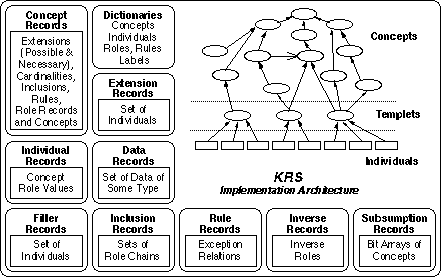Prerequisites: Students should have taken a graduate level AI course (e.g., CMSC 671) or a graduate level database class (e.g., CMSC 661). When: Monday and Wednesday from 5:30pm to 6:45pm Where: we'll meet int eh assigned room (SS103) and, if the class size permits, in ECS230b thereafter Instructor: Tim Finin, finin@umbc.edu TA: tbd Text books and papers: We will use John F. Sowa's book, Knowledge Representation: Logical, Philosophical, and Computational Foundations, which can be purchased at the UMBC bookstore or online. We will also read a number of papers available online or handed out in class. Structure: Class time will be spent with about 60% lecture and 40% student-led presentation and discussion of readings. We will use the class mailing list to carry out additional discussion, comment and interactions. This will be a required part of the course and the quality and level of your participation in online discussions will play a part in determining your grade. So, please read, think about and respond to messages sent to the 771 mailing list. Assignments: Students will be required to prepare and present material to the class, complete a number of short assignments and engage in a longer project, either individually or as part of a group. I believe that the material in this course is best learned by use it, so the short assignments will be designed to give you opportunities to use the concepts and technologies we cover. Presentations should be done in Powerpoint and will be added to a collection for the course and posted to the web. Software: We will use one or more of the following software systems: Concept Map, Loom, Ontolingua, Classic, OKBC, XSB, Prolog, Rational Rose, and Visio. Syllabus: The syllabus is ambitious and we won't be able to cover it all, but we will try. Mailing list: There is a class mailing list with a hypermail archive which you can subscribe to. Send a message to majordomo@cs.umbc.edu with the text "subscribe 771" in the body of the message to subscribe. Resources: There is a page of links to useful web resources.
Academic HonestyWe will follow a policy described in this statement adopted by UMBC's Undergraduate Council and Provost's Office.
By enrolling in this course, each student assumes the responsibilities of an active participant in UMBC's scholarly community, in which everyone's academic work and behavior are held to the highest standards of honesty. Cheating, fabrication, plagiarism, and helping others to commit these acts are all forms of academic dishonesty, and they are wrong. Academic misconduct could result in disciplinary action that may include, but is not limited to, suspension or dismissal. To read the full Student Academic Conduct Policy, consult the UMBC Student Handbook, the Faculty Handbook, or the UMBC Policies section of the UMBC Directory. Cheating in any form will not be tolerated. In particular, all assignments are to be your own work. You may discuss the assignments with anyone. However, any help you receive must be documented. At the beginning of each assignment, you must include a comment indicating the sources you used while working on it (excluding course staff and text), and the type of help you received from them. Failure to include such a statement will result in the assignment being returned ungraded. You may resubmit such a returned assignment once over the course of the semester. Written answers on essay questions for homeworks and papers must be your own work. If you wish to quote a source, you must do so explicitly, using quotation marks and proper citation at the point of the quote. Plagiarism (copying) of any source, including another student's work, is not acceptable and will result in at a minimum a zero grade for the entire assignment. Please review this overview of how to correctly cite a source and these guidelines on acceptable paraphrasing. |

